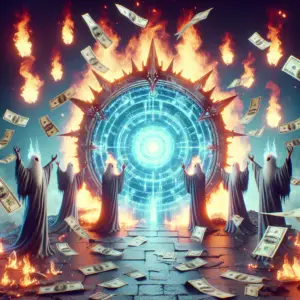Introduction Reaction to Baldur’s Gate 3’s New Epilogue
The introduction to the article reveals the author’s pleasantly surprised reaction to the new epilogue of Baldur’s Gate 3. Initially, the original ending left a somber taste, with companions facing grim fates, evoking a sense of failure akin to the breaking of the Fellowship. However, the new epilogue shifts this narrative dramatically, offering a stark contrast with a surprisingly happy resolution. The reunion of companions six months later paints a picture of recovery and positive outcomes, a refreshing change from the often grim ambiguity that pervades the genre.

(Image credit: Larian Studios)
More on Baldur’s Gate 3
- Baldur’s Gate 3 guide: Everything you need to start your adventure.
- Baldur’s Gate 3 tips: Be prepared with strategies for success.
- Baldur’s Gate 3 classes: Choose the right class for your playstyle.
- Baldur’s Gate 3 multiclass builds: Explore the coolest combinations for your character.
- Baldur’s Gate 3 romance: Discover who you can pursue in the game’s romance options.
- Baldur’s Gate 3 co-op: Learn how multiplayer works and team up with friends.
Narrative Preferences in RPGs
The author expresses a personal preference for RPG narratives that are dark, sad, and ambiguous. They appreciate games like Planescape: Torment, with its existential tragedy, and Fallout: New Vegas, which delves into a complex web of post-apocalyptic ideologies. These games are lauded for their literary-minded approach to storytelling, offering depth and moral complexity.
However, Baldur’s Gate 3 diverges from this trend, embracing a more classic heroic fantasy. The series is known for its potential for almost everyone to be saved and for golden endings to be achieved if the player makes the right choices. The author notes that while you can choose to be deliciously evil, the game’s narrative is more straightforward in its fantasy elements, providing clear consequences for your actions and avoiding the nuanced ambiguity found in other RPGs.
Baldur’s Gate 3’s Epilogue and Its Implications
The epilogue of Baldur’s Gate 3 provides definitive answers to the consequences of the player’s choices throughout the game. The outcomes are clear-cut, offering a sense of closure and understanding of the impact of one’s decisions.
| Choice | Outcome |
|---|---|
| Letting Gale or Astarion become godlike | Bad idea, leads to negative consequences |
| Keeping Shadowheart’s parents alive | She’s happier, albeit a little cursed |
| Not curing the Dark Urge | Clearly a bad idea with grim results |
These outcomes are not just arbitrary; they logically follow from the actions taken by the player. For example, empowering Gale with the Crown of Karsus or turning Astarion into an Ascendent Vampire has predictably dire results. Similarly, failing to cure the Dark Urge leads to a dark and foreboding ending. The game’s epilogue removes ambiguity and spells out the right and wrong choices, aligning with the wish-fulfillment nature of its story.

(Image credit: Larian Studios)
Comparing Other RPG Endings
The article compares the endings of other RPGs like Cyberpunk 2077: Phantom Liberty and Divinity: Original Sin 2 to that of Baldur’s Gate 3. These games present a different approach to narrative closure, often leaving players with a sense of ambiguity and unresolved consequences.
In Cyberpunk 2077: Phantom Liberty, the noir narrative culminates in a choice that forces the player to betray someone who trusted them, with no clear right or wrong decision. The game’s expansion, Phantom Liberty, introduces a new ending that is even more bleak than the original ones, emphasizing the theme and message over a neatly tied-up conclusion.

(Image credit: CD Projekt)
Meanwhile, Divinity: Original Sin 2 offers a heroic tone similar to Baldur’s Gate 3, but its endings carry a bittersweet note. The game’s conclusion can be discordant, with abrupt romance break-offs and a choice to either assume divine power or bestow it upon a villain, despite the game’s depiction of deities as flawed beings.

(Image credit: Larian Studios)
The author appreciates the commitment of CD Projekt Red to maintain the thematic integrity of Cyberpunk 2077’s endings, even when it means leaving players with difficult questions. This contrasts with Baldur’s Gate 3’s approach, which opts for a more definitive and satisfying conclusion that aligns with the game’s overall tone.
Conclusion on Story Choices in Baldur’s Gate 3
The conclusion of the article reflects on the significance of story choices in Baldur’s Gate 3 and their impact on the game’s various endings. The author emphasizes the satisfaction derived from their own game ending, which was a result of the choices they made throughout their journey. The game’s narrative flexibility is praised for accommodating different player decisions, whether they lead to a happy, dark, or bittersweet ending.
The author’s personal experience with the game’s ending was positive, describing it as “mushy and sweet,” which was in line with their actions of consistently saving the day. This outcome demonstrates that a downer ending, much like a happy one, must be earned by the story to avoid feeling cheap or abrupt. Baldur’s Gate 3 offers players the freedom to shape their story, ensuring that the ending feels like a natural consequence of their choices throughout the game.












